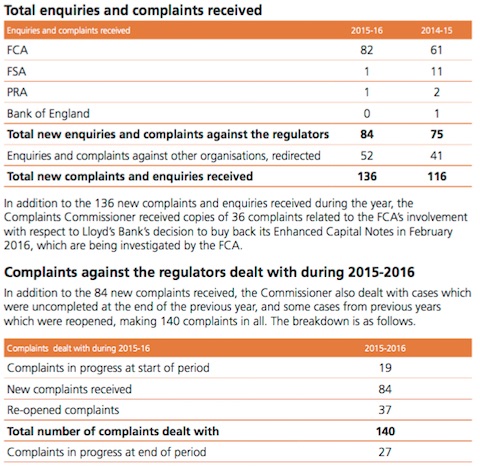The FCA has shown unwillingness to admit flaws in how it handles complaints, The Complaints Commissioner has claimed.
The regulator has been criticised by The Complaints Commission for delays in “awkward” cases, “inadequate explanations of decisions” and “insufficient curiosity in pursuing complaints”.
These were highlighted in the commission's annual report, published yesterday.
All financial regulators are required by law to run a Complaints Scheme to investigate complaints about the way in which they undertake their functions.
The Complaints Commissioner received 136 new complaints and enquiries during the year, which was a rise of 17%. About a third of these were complaints about financial services providers or other bodies, rather than the regulators. These complaints were redirected.

Source: Complaints Commissioner
Complaints Commissioner Antony Townsend said: “While the FCA continues to deal with the majority of complaints competently and fairly, I have seen examples of an unwillingness to face up to and admit shortcomings, and delays in dealing with “awkward” cases.
“There has also been a tendency to find reasons for excluding cases from the Complaints Scheme in circumstances where, in my view, they should not have been excluded.
“The FCA Complaints Team faced both a significant turnover of staff, and a significantly rising workload, in the context of a year in which the organisation as a whole faced some significant criticisms and uncertainty. My observation, gleaned from studying the FCA’s internal complaints papers and the interactions of my colleagues with FCA staff, is that these factors increased the FCA’s tendency to defensiveness in the face of criticism.”
The Commissioner emphasised the importance of the Complaints Scheme and the FCA’s Complaints Team for the FCA’s reputation.
He said: “Preserving a robust Scheme, with an independent element, even where there may be occasional uncomfortable decisions, is essential. The FCA must resist the tendency to become introspective and defensive.”
He has advised the FCA needs to:
• Ensure that its Complaints Team has the resources it needs to investigate cases thoroughly and promptly;
• Ensure that the Complaints Team has the confidence, authority, and internal political backing to pursue its challenging duties rigorously;
• Recognise that the entire organisation has a duty to co-operate openly and promptly with complaints investigations.
The Commissioner made the following criticism, noted from “a small but significant number of cases – particularly the more complex ones” in the last year:
• A tendency to look for reasons to exclude cases from the Scheme;
• A tendency to use the existence of parallel proceedings as a reason for not investigating a complaint, without sufficiently testing whether or not an investigation would be possible;
• A focus on procedural and jurisdictional issues, sometimes at the expense of considering the substantive issue of the complaint;
• Insufficient curiosity in pursuing complaints;
• Insufficient acknowledgement of the impact of bureaucratic errors;
• Unnecessary delays in the handling of complaints, and failure to keep complainants updated on progress;
• Inadequate explanations of decisions. Insufficient curiosity in pursuing complaints
FCA response
The FCA stated that it takes the Commissioner advice seriously. An FCA publication, responding to the report, stated: “While we may occasionally disagree with his view, we are continually learning from his decisions and we take them into account when we decide the most appropriate way to treat new complaints. We note that the Commissioner recognises that the Scheme should not be used as an appeal mechanism to substitute one possible regulatory judgment for another.
“We note the Commissioner’s comments about the unnecessary delay in the handling of complaints and our failure to update complainants. We aim to be flexible in our approach and to resolve complaints quickly and impartially while treating complainants with courtesy.
“However, it is clear from the Commissioner’s report that we have not achieved these aims consistently. In 2015-16 we concluded over 80% of complaints within eight weeks of receipt.
“We accept that on occasion we have not provided some complainants with timely updates about their complaint, but we are confident that such occasions were exceptions. In general we do maintain regular contact with complainants throughout the investigation of their complaint.”
Regarding appearing “defensive or unhelpful”, officials said The FCA would aim to provide complainants with more useful information where possible but law prohibits it from the disclosure of confidential information and it would not be able to regulate effectively without this.
The FCA also said it recognised “the importance he places on information and acknowledge that we could at times explain our thinking more fully.”
The FCA concluded: “We welcome the Complaints Commissioner’s Annual Report for 2015-16. We consider his role to be a key part of our accountability. We value the important role that the Commissioner carries out and appreciate his insight and advice on areas where we can make improvements to our processes. The Commissioner makes a number of suggestions for improvements in his report and, as he notes, we are working with him on these and other initiatives to improve our complaints process.”

